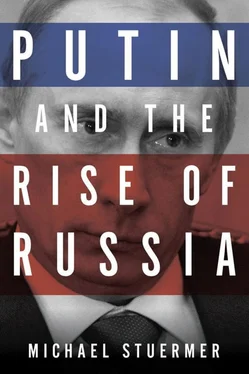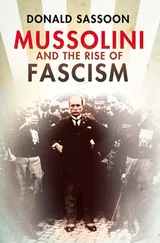But Primakov, buoyed by his popularity at home, now began to give up his neutrality and put pressure on the oligarchs. This implied looking also at deals with which the ‘family’ was associated. Money-laundering and corruption were among the accusations hurled in the direction of powerful owners of powerful concerns. The General Prosecutor Skuratov was said to have in his safe a list of foreign bank accounts in the name of high-ranking Kremlin officials. Yeltsin, against a vote in the Duma, ordered him to stop his investigations. Was he a hero, or a gangster? How could people tell? What was going on was a struggle for control, and the stakes were as high as the spoils. In retrospect it looks like an unscripted fight for raw power. At the time, it was a cloak-and-dagger story defying description, let alone detailed analysis from outside.
One of the key figures was Berezovsky, and he might have been taken into custody had it not been for the protection extended by the FSB, more precisely by its chief. Berezovsky was close to Yeltsin, and if Berezovsky fell, Yeltsin would be badly hurt. Putin, however, stood by the oligarch and by the ‘family’. This, in turn, earned him another promotion. In March 1999 he was appointed head of the National Security Council while continuing to be in charge of the FSB.
While the succession crisis was looming, East-West relations took a turn for the worse. NATO intervened against Serbia in order to prevent genocide or, in the modern version, ‘ethnic cleansing’ in Kosovo. The Albanian guerrillas fought Serbian troops, and vast numbers of Albanians fled north towards Austria, Switzerland and Germany. In Russia, age-old sympathies with Serbia threatened to boil over while the Kremlin recognized the mounting danger to the Russian federation if Kosovo set a precedent for other ethnic groups fighting for independence. Russians have not forgotten the separatist temptations affecting many of their minorities in the early Yeltsin years. Even where those concerns were seen as way beyond reality, the fact that NATO forces could attack while Russia’s opposition in the UN was simply pushed aside was a shock, and has certainly contributed in no small way to the surge of Russian nationalism ever since. Kosovo was a traumatic experience, taking off the shine from Western democracy and encouraging strong-arm solutions to Russia’s own problems, especially in the Northern Caucasus. But while Primakov tried to use outrage in Russia to consolidate his support in the population at large, the ‘family’ decided – and Putin obviously concurred – that given the sad state of the oil price and the looming succession crisis, discretion was the better part of valour. Kosovo and the future of Serbia’s strong man Slobodan Milosevic were not the most pressing item on the agenda.
The power struggle under way reached crisis point, and high drama ensued. The Duma majority, dominated by Zyuganov’s communists, went for the jugular and prepared impeachment charges against Yeltsin, citing five major reasons: high treason against the Soviet Union in 1991 and destruction of the army; coup d’état in dissolving parliament in 1993, which led to the bombardment of the ‘White House’ in the centre of Moscow; misuse of office in unleashing the Chechen war of 1994; failing the Russian people through misguided reform. If the Duma succeeded, Yeltsin, after having lost most of his political power, would also lose the legal right to run Russia. In constitutional terms, the legislature and the executive blocked each other. In real terms, the spectre of the erstwhile Soviet Union stood up from its shallow grave to threaten the new, post-Soviet Russia.
In the ensuing struggle, Yeltsin answered the opening move of parliament by firing Primakov, although his government had presided over a modest improvement of state finances, a reduction in runaway inflation, a slight economic recovery and had even secured new loans from the IMF. The Duma had the right to refuse three times Yeltsin’s nominee for prime minister, but then the President could dissolve parliament; however, he could do so only if the impeachment process had not yet been set in motion. There was talk in Moscow about civil war.
These were trying times, especially for the man at the helm of the National Security Council and the FSB. Putin had gone too far to entertain second thoughts about where his loyalties lay, but he had his usual luck. The five-point impeachment vanished when the Duma, with the smallest of majorities, refused to open proceedings – whatever reasons lay behind the change of mind of a crucial number of deputies. The Kremlin administration had, by hook or by crook, won the day. Berezovsky, the Kremlin’s éminence grise at the time, boasted to the communists: ‘We shall never cede power to you.’ The Kremlin had won back the initiative. The new prime minister was Sergei Stepashin, a former general in the police and, more recently, first deputy prime minister under Primakov and minister of the interior, in charge of the most powerful ministry.
Stepashin was more of a bureaucrat and by no means a mud-on-the-boots military type like Alexander Lebed who, with his considerable diplomatic skill and popular charisma, might have become a Russian Pinochet if given the chance. Stepashin was, for the time being, a compromise candidate, acceptable to the victors around the President, acceptable also to the vanquished in the Duma. His paramount task was, as Yeltsin’s entourage put it, possibly with a sardonic smile, ‘to safeguard the legal character of the elections’.
Once again, the choice was between returning to a Soviet-style regime or soldiering on, pursuing more or less the road to a post-Soviet sustainable system of government. ‘God will be merciful,’ a Soviet energy minister had said when on a visit to Bonn in 1998, referring to the lack of basic provisions. And God, or the archangel presiding over oil prices, was indeed merciful.
Siding with the oligarchs
In that summer of 1999 oil prices began to pick up, slowly but steadily, and the men running Russia could breathe more easily. But the cabinet imposed on Stepashin by the ‘family’ looked too much like an insiders’ club of oligarchs and their princes. Berezovsky was suspected of picking his cronies, and together with young Roman Abramovich, using his Siberian oil wealth, he seemed to control all money matters of importance. They were powerful players, but none of them secured the trust of the ‘family’ to win the forthcoming elections. The prize would go to the man who could win the full trust of the Kremlin and ensure that, after the event, no painful questions would be asked, let alone criminal proceedings opened on the lines proposed, only a few months earlier, by the Duma.
Luzhkov of Moscow was a runner-up, enjoying much support on TV. Primakov could profit from his professional image and his posture as a kind of political patriarch, supported by the regions. On the liberal left Nemtsov, Kiriyenko, Gaidar, and Yavlinsky were preparing to run. The most dangerous candidate, in the eyes of the ‘family’, was Luzhkov. He formed a movement named ‘Fatherland’ to promote a leader much more than an ideology, gathering widespread support including that of Tatarstan’s powerful president Mintimer Shaimiev, who brought not only the resources of his oil-rich republic but also the sympathies of a couple of million Muslims. The communists under Zyuganov campaigned against the President, renewing their wild accusations and promising re-nationalization of key industries. The ‘family’, meanwhile, drifted into a strange state of both nervousness and paralysis – a typical case of fin de régime . The only good news was coming from the oil markets: prices were rising, and tax receipts began picking up.
Читать дальше











